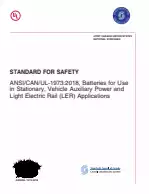Standard for Batteries for Use in Stationary, Vehicle Auxiliary Power and Light Electric Rail (LER) Applications
Also Known As: ANSI/CAN/UL 1973:2018
The UL 1973:2018 standard sets forth requirements for battery systems used in various applications. These battery systems are intended for energy storage in stationary applications, such as PV and wind turbine storage, as well as for UPS applications. They are required to be installed in accordance with applicable installation codes, such as NFPA 70 and C22.1.
Additionally, the standard covers battery systems used in light electric rail (LER) applications and stationary rail applications, such as rail substations. These battery systems may be installed within the rail car or a sheltered stationary location. They can utilize regenerative braking from trains for recharging and can be directly or indirectly connected to rail power lines. The purpose of these battery systems is to balance loads during peak hours, provide energy storage during regenerative braking, and serve as a source of emergency power for moving trains during power outages.
The standard includes specific requirements for sodium-beta type technologies and flowing electrolyte technologies in its appendices. It evaluates the ability of battery systems to withstand simulated abuse conditions, based on the manufacturer's specified charge and discharge parameters. However, it does not evaluate the performance or reliability of these devices, such as capacity measurements under various discharge and environmental conditions.
The standard also provides examples of boundary diagrams for a battery system and a module, illustrating the components involved in these applications.
| Edition | 2 |
| Language(s) | English |
| File Size | 1.5 MB |


